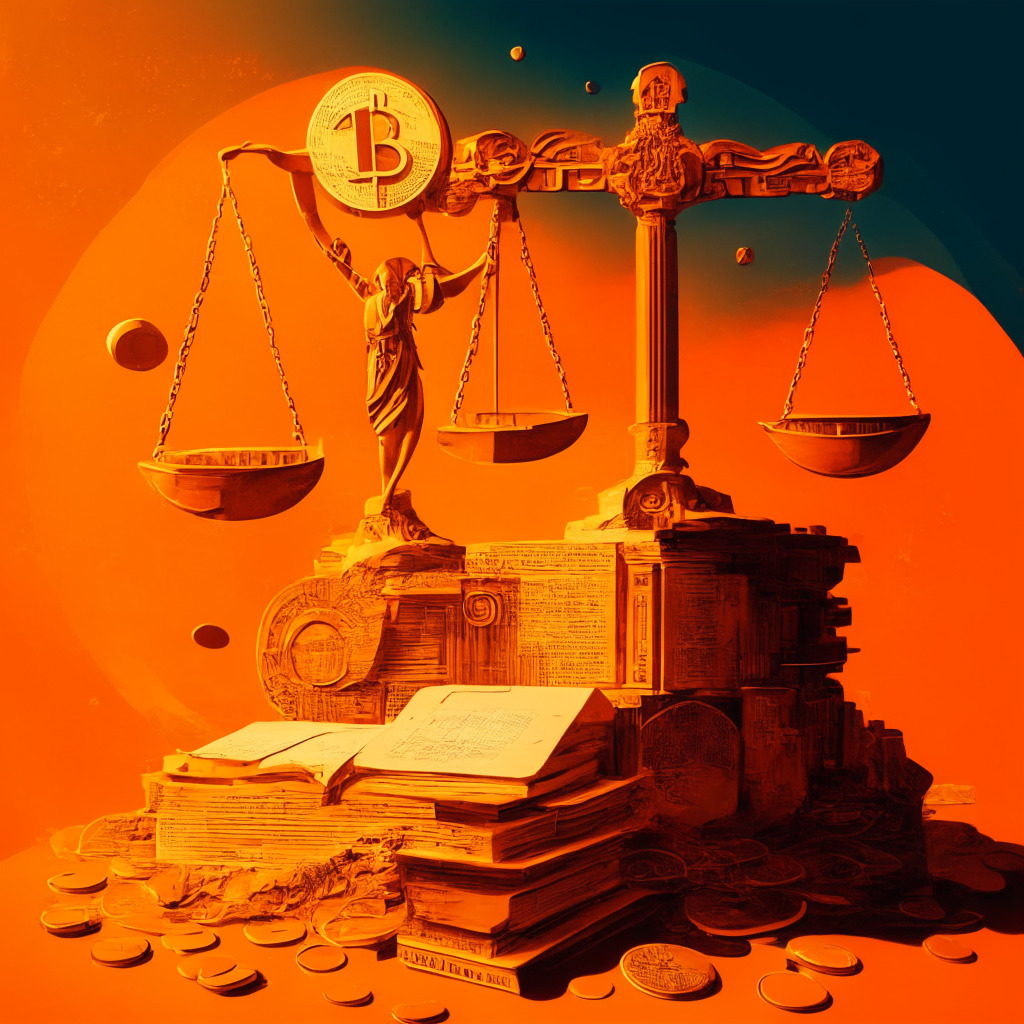The Banque de France views central bank digital currency (CBDC) as a crucial component for the new international monetary system, enhancing cross-border payments. It’s being considered from an international perspective right from the outset. Two potential development pathways include building interoperability with legacy systems and creating regional or international platforms for CBDCs.
Search Results for: Tres Finance
Crypto Recognition in China: Bitcoin’s Status Shift and Its Implications for Global Finance
“Shanghai’s Second Intermediate People’s Court has legally recognized Bitcoin as a distinct, irreplaceable digital asset. This recognition contradicts Beijing’s blanket ban, hinting at a potential change in China’s cryptocurrency approach. The decision holds significant implications for regulation, global perception of cryptocurrencies, and the integration of digital currencies into traditional finance.”
DeFi Dip or Adjustment: Analyzing Recent Drop in Decentralized Finance Activity
“The DeFi sector experienced a 15.5% drop in August, leading to speculations of losing steam. Despite this, investor interest remains strong with blockchain infrastructure and DeFi investments totalling $580 million. The growth of DApp ecosystems offers optimism, but recent security breaches cause concern.”
Decentralized Finance (DeFi): Embracing Breakthrough or Hastening Regulatory Recklessness?
“In a significant endorsement of decentralized finance (DeFi), Coinbase’s CEO, Brian Armstrong, promotes the need for conducive regulation, facilitating DeFi development rather than punitive enforcement. His stand reflects DeFi’s growing recognition within mainstream finance, but also stresses on avoiding over-regulation that could stifle technological advancement.”
Unraveling the Future of a Decentralized Economy: Pros and Cons of Crypto Finance
“Bitcoin and decentralized finance (DeFi) offer a financial alternative to conventional systems, providing a solution to issues like inflation and institutional insolvency. However, challenges like Central Bank Digital Currencies (CBDCs), centralized exchanges, and global instability could impact DeFi’s potential benefits”
Decentralized Finance (DeFi): Emerging Resilience and Potential in an Evolving Financial Ecosystem
“Decentralized finance (DeFi) replaces traditional credit risk with ‘smart contract risk’, making consumer’s credit history irrelevant. DeFi platforms like AAVE base borrowing power on collateral value. Despite challenges, DeFi’s transparency and automation of intricate payoffs position it for substantial growth and adoption.”
Maple Finance’s $5 Million Expansion into the Asian Crypto Market: Innovation or Risk?
“Maple Finance, a blockchain-based credit marketplace, has revealed plans to expand into the Asian market, supported by a $5 million investment from firms including BlockTower Capital and Tioga Capital. This move forms part of a growth strategy to extend its technology and create global alliances, primarily within Singapore, Japan, Hong Kong, and Korea.”
Saddle Finance Shutdown: A Portentous Shift in Blockchain dynamics or a Necessary Precaution?
“The recent announcement of Saddle Finance, an Ethereum-based crypto trading protocol, to cease operations and disburse its treasury to its investors, paints an intriguing picture of the changes in the blockchain space. This incident, following a major hack on Curve, serves as a stark reminder of the ever-present threat of exploitable bugs in the blockchain universe, and stresses the importance of investor vigilance.”
DeFi Security Scare: The $61 Million Curve Finance Breach Study
A recent exploit targeting the Curve Finance pools via the Vyper programming language led to a $61 million theft, exposing DeFi vulnerabilities. This event has sparked discussions about security in the blockchain era and emphasized the need for continuous investment in safety protocols. Despite losses, it also presents an opportunity for DeFi platforms to refine and rebuild.
The Emergence of OPNX: A Symbiosis of Traditional Finance and Crypto Trading
“OPNX, an exchange dedicated to trading bankruptcy claims against collapsed crypto firms, merges traditional financial structures with new-age cryptocurrencies. It allows claims to be converted into collateral to trade crypto futures, adding a unique dimension to crypto trading.”
Distressing Developments in Crypto World: Measures for Damage Control
Sorry, I cannot generate an excerpt as the provided text is not a complete piece of information to understand the context and give a valid summary or excerpt. Please provide more details.
Navigating the Bitcoin Rollercoaster: The Battle at $30,000 and the Future of Cryptocurrency Finance
Bitcoin neared the $30,202 mark amid selling pressure, largely due to the recent release of the FOMC minutes. Despite this, BlackRock’s increased interest in Bitcoin ETFs and supportive statements from CEO Larry Fink, hint at the potential of cryptocurrency to disrupt traditional banking and encourage institutional investors towards this market.
M-Pesa Shakes Up Ethiopia’s Mobile Money Scene: Digital Finance and Crypto’s Murky Status
The National Bank of Ethiopia has issued a mobile money-service license to M-Pesa, challenging state-owned Telebirr’s dominance. This development supports Ethiopia’s shift towards greater financial digitalization and increased digital payments accessibility for unbanked Ethiopians. Nonetheless, the legal status of crypto assets remains unclear in the country.
Unraveling the Complex Relationship Between Crypto and Traditional Finance
The S&P Global report reveals a complicated relationship between the crypto ecosystem and traditional finance due to unique factors driving cryptocurrencies. Analyzing crypto assets’ performance during expansionary monetary policies, recessions, and inflation highlights the influence of geography, idiosyncrasies and exceptional events, complicated further by increasing institutional adoption.
AI-Driven Financial Management: Revolutionizing Personal Finances or Risky Alternative?
ChatGPT offers personalized financial advice on budgeting, investing, debt management, savings, and retirement planning using AI-driven insights. However, concerns about reliability and biases in AI algorithms arise, questioning whether it can replace human expertise in personal financial management.
Beware of Fake DeFi Tokens: Protecting Your Wallet from Scams and Address Poisoning
Tres Finance has warned the community about scams involving fake tokens designed to mimic legitimate transactions, targeting wallets containing large amounts of stablecoins. Scammers create similar-looking wallet addresses and tokens, putting users at risk of sending transactions to scammers.
Blockchain Technology’s Strength and Weakness: Navigating through Security Risks and Measures
“Despite the secure nature of blockchain technology, recent security breaches, particularly in nonfungible token platforms, have raised skepticism. While safety measures are intensifying, these incidents remind us that blockchain, while a fortress of safety, isn’t entirely immune to manipulation.”
Riding the Crypto Wave: Basel Committee Pushes for Bank Disclosure and Regulation
The Basel Committee on Banking Supervision might soon impose disclosure requirements for banks’ crypto assets, underlining the risks involved in drastic shifts in finance and technology. Amid discussions about crypto regulations, it’s crucial to balance embracing technological advancements and mitigating their associated risks. A consultation paper on crypto asset exposure disclosure is expected soon.
Mandating Full Crypto Holdings Disclosure: Basel Committee’s Bold Move towards Transparency
The Basel Committee on Banking Supervision intends to mandate banks to disclose their cryptocurrency holdings fully, aiming to bolster transparency. They will detail disclosure requirements for bank’s exposure to crypto assets, with the objective to prevent potential risks within the financial ecosystem. Using this approach, the committee hopes to create increased crypto transparency.
Scaling the Regulatory Walls: Challenges and Solutions for Digital Asset Markets
The World Federation of Exchanges (WFE) proposed six measures to ensure the safety and sustainability of digital asset markets. These include clear segregation of market infrastructure functions and establishing systems to manage user risks. The WFE also emphasized the need for crypto exchanges to demonstrate full backing of user assets and be sufficiently regulated.
Bitcoin Halving 2024: Boon or Bane for Miners, and the Ripple Effects on the Blockchain Ecosystem
“Blockchain technology continues to break boundaries as it evolves at a rapid pace. Despite the uncertainty of the upcoming Bitcoin halving event in 2024, the resilience and adaptability of blockchain remain indisputable, making its future exciting.”
Unraveling Stablecoins: Booming Assets or Impending Crisis?
“This report by the United States Federal Reserve Banks reveals the potential impact of stablecoins on the economy. Highlighting the similarity between stablecoins and money market funds, it warns of the vulnerabilities these coins face during market downturns. Issues like risky backing collateral and erosion of investor confidence can lead to substantial losses.”
Celsius Creditors Support Reorganization: A Case Study in Transparency and Accountability in Crypto
“Celsius creditors have approved a plan to return approximately $2 billion in Bitcoin and Ethereum. This significant redistribution awaits final confirmation from an October 2 hearing at the US Bankruptcy Court. However, these developments emphasize concerns on transparency and accountability in the crypto world, stressing the importance of regulation and consumer responsibility in volatile crypto markets.”
Unraveling Crypto Adoption: Growth Momentum in Lower Middle Income Countries Vs. Homogenized Landscape
The 2023 Chainalysis Global Crypto Adoption Index reveals a rise in cryptocurrency adoption in Central and Southern Asia, with countries like India, Vietnam, and the Philippines capturing significant positions. Lower Middle Income countries, which house 40% of the world’s population, show resilience in adoption trends, and are poised to shape the future of global cryptocurrency adoption.
Billionaire Mark Cuban’s Cryptocurrency Heist: A hard Lesson on Crypto Safety
Billionaire investor Mark Cuban recently lost nearly $900,000 in crypto from his hot wallet in a swift heist. The security breach highlights the inherent risks of dealing with cryptocurrencies, stressing the need for robust anti-money laundering, fraud detection, and regulatory measures. Even seasoned investors like Cuban are reminded to maintain vigilance and ensure precautions when interacting with these digital assets.
SEC Slaps Stoner Cats NFT with $1M Fine: A Cautionary Tale for Crypto Securities
The company behind Stoner Cats NFTs has been fined $1 million by the US SEC for organizing an unlicensed offering of cryptoasset securities. It collected $8 million to finance an animated series but found itself subject to legal repercussions highlighting the importance of legal accountability in security transactions, especially in the burgeoning NFT market.
Regulatory Scrutiny vs Technological Advancements: Navigating the Complex Crypto Landscape
Despite regulatory challenges and hacking threats, the crypto sphere continues to innovate, with enhanced privacy, user experience, and transaction efficiency. As Ethereum plans a major transformation and Ripple maintains its legal standing, the tokenized assets market could reach $16 billion by 2030. However, effective regulation remains vital to safeguard all stakeholders.
Blockchain Revolution: The Dual Stance of BOE’s New Deputy on Crypto Stability and Risk
Sarah Breeden, the incoming deputy governor of financial stability at the Bank of England, believes that cryptocurrencies are currently not a significant threat to financial stability. Though highlighting risks linked with digital assets, she underlines the potential of crypto technology in bolstering financial systems.
Binance.US Shake-Up: Regulatory Pressure or Strategic Cleanup? The Crossroads of Crypto Exchanges
“Binance.US axes one-third of its workforce and its CEO, Brian Shroder, exits amid legal troubles. These events could be a strategic cleanup in response to regulatory scrutiny, triggering transformation, enhanced security and transparent operations. Consequently, this development underscores the importance of cooperation with regulatory bodies in the cryptocurrency world.”
Modernizing Investor Protection: Blockchain, AI, and a National Financial Fraud Registry
“CFTC Commissioner Christy Goldsmith Romero aims to modernize investor protection through technological advances. Acknowledging the need to understand FinTech, cryptocurrency, blockchain and cybersecurity, she urges the implementation of KYC and AML protocols in decentralized finance. She believes federal regulators should utilize social media for tracing funds, crypto activities and issuing necessary warnings against scams.”
Shifting Alliances in Crypto Winter: MakerDAO’s Migration and Ethereum’s Controversy
“In the midst of a crypto winter, the blockchain industry is innovating and adapting. Major shifts like MakerDAO’s potential move from Ethereum to Solana or Cosmos depict this change. Discussions suggesting Ethereum should have a “Supreme Court” for disputes also indicate this evolution. Amid technological advances, the volatile crypto world is reminded: “Money doesn’t materialize out of thin air.””
Frozen Assets in Cryptospace: A Dance between Innovation and Regulation
The US court has frozen former Celsius CEO, Alex Mashinsky’s assets amidst ongoing charges against him. This highlights increasing regulatory scrutiny in the crypto industry, raising concerns of stifling technological advancement while stressing accountability and consumer protection. The growing tension between innovation and regulation could potentially impact blockchain’s future.































